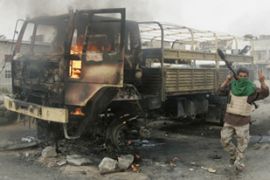Iraq PM offers money for arms
Al-Maliki struggles to contain conflict with Shia militia after more than 130 people are killed.

Mahdi Army control
| In depth | |
Pictures |
Al-Maliki has based himself in Basra to personally oversee military operations in the city.
Few journalists have been able to travel to the city, but witnesses said Basra‘s streets were deserted, with shops and businesses shut.
Hassan, a resident of Basra, told Al Jazeera: “For two days now, we woke up to sounds of explosion – we have never witnessed such huge
attacks in Basra.”
He said all cities roads had all been blocked, while Mahdi Army fighters attack Iraqi forces from residential and commercial blocks.
‘Historic mission’
In a speech broadcast on state TV, al-Maliki said: “We have made up our minds to enter this battle, and we will continue until the end.”
He said Iraq had become a “nation of gangs, militias and outlaws” and he was undertaking an “historic mission” in Basra to restore “the law of the land”.
| Your Views |
The Basra crackdown is seen as a key test for al-Maliki, with the ability of Iraq‘s leaders and armed forces to control such situations central to US hopes of pulling its own forces out of the country.
At a speech in Ohio on Thursday, George Bush, the US president, praised al-Maliki, citing the violent crackdown on Basra as evidence that his government is increasingly able to handle security without US leadership.
Bush’s speech at a US air force museum in Dayton is one of a series of addresses made in defence of the five-year-old war in Iraq, and intended to prove that the so-called troop surge is having an effect.
Rejecting suggestions that Iraq‘s leaders were “foot dragging”, he said they were “striving to build a modern democracy on the rubble of three decades of tyranny.”
‘Bold decision’
Praising what he said was al-Maliki’s “bold decision” to take on the Basra militias, he said the move was a turning point in showing that Iraq is taking on more responsibility.
“There’s a strong commitment by the central government of Iraq to say that no one is above the law,” Bush said.
Thousands of al-Sadr supporters in Baghdad on Thursday demonstrated against the current crackdown, calling on the Iraqi prime minister to resign.
In the Kazimiyah neighbourhood, marching protesters denounced al-Maliki as a “new dictator” while carrying a coffin bearing a crossed-out picture of the US-backed prime minister.
Protests also took place in the mainly Shia district of Sadr City.
Al-Sadr himself released a statement on Thursday calling for a political solution to the growing crisis and an end to the “shedding of Iraqi blood.”
But the statement, released by a close aide, stopped short of ordering the Mahdi Army to halt fighting.
